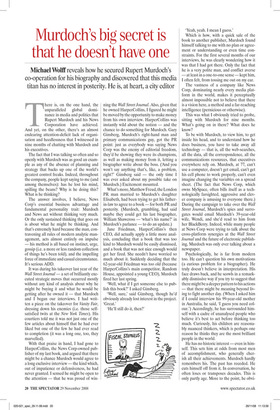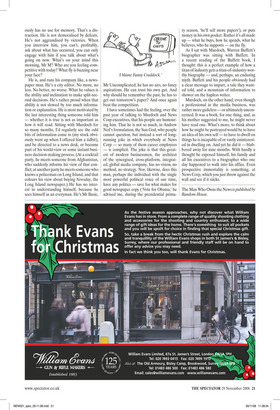Murdoch’s big secret is that he doesn’t have one
Michael Wolff reveals how he secured Rupert Murdoch’s co-operation for his biography and discovered that this media titan has no interest in posterity. He is, at heart, a city editor There is, on the one hand, the unparalleled global dominance in media and politics that Rupert Murdoch and his News Corporation have achieved. And yet, on the other, there’s an almost endearing attention-deficit lack of organisation and heedlessness that I witnessed in nine months of chatting with Murdoch and his executives.
The fact that I was talking so often and so openly with Murdoch was as good an example as any of the absence of planning and strategy that backs up one of the world’s greatest control freaks. Indeed, throughout the company, people kept saying to me (and among themselves): has he lost his mind, spilling the beans? Why is he doing this? What is he thinking?
The answer involves, I believe, News Corp’s essential business advantage and fundamental personality trait: Murdoch and News act without thinking very much. Or the only sustained thinking that goes on is about what he might be thinking. And that’s extremely hard because the man, contravening all rules of modern analytic management, acts almost entirely on impulse — his method is all based on instinct, urge, gossip (i.e. a more or less random collection of things he’s been told), and the impelling force of immediate and casual circumstance. It’s serious ADD.
It was during his takeover last year of the Wall Street Journal — a set of brilliantly executed strategic moves that occurred mostly without any kind of analysis about why he might be buying it and what he would be getting after he owned it — that Murdoch and I began our interviews. I had written a piece on the takeover for Vanity Fair, dressing down his enemies (i.e. those selfsatisfied twits at the New York Times). His courtiers told me it was not just one of the few articles about himself that he had ever liked but one of the few he had ever read to completion (it was a long one, too, they marvelled).
With that praise in hand, I had gone to HarperCollins, the News Corp-owned publisher of my last book, and argued that there might be a chance Murdoch would agree to a long exclusive interview — the kind which, out of impatience or defensiveness, he had never granted. I sensed he might be open to the attention — that he was proud of win ning the Wall Street Journal. Also, given that he owned HarperCollins, I figured he might be moved by the opportunity to make money from his own interview. HarperCollins was instantly wild about the notion — and the chance to do something for Murdoch. Gary Ginsberg, Murdoch’s right-hand man and primary communications guy, got the PR point: just as everybody was saying News Corp was the enemy of editorial freedom, they’d be showing they were its champions, as well as making money from it, letting a biographer write about the boss. (‘And you won’t say anything that’s, like, a problem, right?’ Ginsberg said — the only time I was ever asked about my possible take on Murdoch.) Excitement mounted.
What’s more, Matthew Freud, the London PR man married to Murdoch’s daughter Elisabeth, had been trying to get his fatherin-law to agree to a book — for both PR and posterity. (Murdoch, grumbling, had said maybe they could get his last biographer, William Shawcross — ‘what’s his name?’ in Murdoch’s parlance — to do an update.) Jane Friedman, HarperCollins’s then CEO, did actually apply a little more analysis, concluding that a book that was too kind to Murdoch would be easily dismissed, and a book that was not nice enough would get her fired. She needn’t have worried so much about it. Suddenly deciding that the 62-year-old Friedman was too old (because HarperCollins’s main competitor, Random House, appointed a young CEO), Murdoch fired her last spring.
‘Well, what if I get someone else to publish this book?’ I asked Ginsberg.
‘Well, sure,’ said Ginsberg, though he’d obviously already lost interest in the project. ‘Great.’ ‘He’ll still do it, then?’ ‘Yeah, yeah. I mean I guess.’ Which is how, with a quick sale of the book to another publisher, Murdoch found himself talking to me with no plan or agreement or understanding or even time constraints. For the first several months of our interviews, he was clearly wondering how it was that I had got there. Only the fact that he is a very polite man, and conflict averse — at least in a one-to-one sense — kept him, I often felt, from tossing me out on my ear.
The vastness of a company like News Corp, dominating nearly every media platform in the world, makes it perceptually almost impossible not to believe that there is a vision here, a method and a far-reaching intelligence (pernicious or otherwise).
This was what I obviously tried to probe, sitting with Murdoch for nine months. What’s going on in there? What does he know?
To be with Murdoch, to view him, to get inside his head, and to understand how he does business, you have to take away all technology — that is, all the web-searches, all the data, all the correspondence, all the communications resources, that executives everywhere rely on. Murdoch, at 77, can’t use a computer, doesn’t get email, can’t get his cell phone to work properly, can’t even imagine changing the variables on a spread sheet. (The fact that News Corp, which owns MySpace, often bills itself as a technologically farsighted, aggressive and clever company is amusing to everyone there.) During the campaign to take over the Wall Street Journal, Murdoch’s spies and surrogates would email Murdoch’s 39-year-old wife, Wendi, and she’d read to him from her BlackBerry. Indeed, while many people at News Corp were trying to talk about the cross-platform synergies at the Wall Street Journal and the future of electronic publishing, Murdoch was only ever talking about a newspaper.
Psychologically, he is far from modern too. He can’t question his own motivations (a curious problem for a biographer). He truly doesn’t believe in interpretation. His face draws back, and he scowls in a remarkably dismissive way if you try to suggest that there might be a deeper pattern to his actions — that there might be meaning beyond living to fight another day. (When I asked him if I could interview his 99-year-old mother in Australia, he said, ‘I guess you need colour.’) Accordingly, he has surrounded himself with a cadre of unanalysed people who believe it’s best to act before thinking too much. Curiously, his children are reasonably nuanced thinkers, which is perhaps one reason he thinks they are the most brilliant people in the world.
He has no historic interest — even in himself. This sets him at odds from most men of accomplishment, who generally cherish all their achievements. Murdoch hardly remembers his. The past has receded. He cuts himself off from it. In conversation, he often loses or transposes decades. This is only partly age. More to the point, he obvi ously has no use for memory. That’s a distraction. He is not demoralised by defeats. He’s not aggrandised by victories. When you interview him, you can’t, profitably, ask about what has occurred, you can only engage with him if you talk about what’s going on now. What’s on your mind this morning, Mr M? Who are you feeling competitive with today? What fly is buzzing near your face?
He is, and runs his company like, a newspaper man. He’s a city editor. No more, no less. No better, no worse. What he values is the ability and inclination to make split-second decisions. He’s rather proud when that ability is not slowed by too much information or explanation. He is most motivated by the last interesting thing someone told him — whether it is true is not as important as how it will read. Sitting with Murdoch for so many months, I’d regularly see the odd bits of information come in (my stock obviously went up when I offered him a tidbit), and be directed to a news desk, or become part of his world-view or some instant business decision-making process. (At a cocktail party, he meets someone from Afghanistan, who suddenly informs his view of that conflict; at another party he meets someone who knows a policeman on Long Island, and that colours his view about buying Newsday, the Long Island newspaper.) He has no interest in understanding himself, because he sees himself as an everyman. He’s Mr Basic, Mr Uncomplicated; he has no airs, no fancy aspirations. He can trust his own gut. And why should he remember the past, he has to get out tomorrow’s paper? And once again beat the competition.
I have sometimes had the feeling, over the past year of talking to Murdoch and News Corp executives, that his people are humouring him. That he is not so much, in Andrew Neil’s formulation, the Sun God, who people cannot question, but instead a sort of longrunning joke in which everybody at News Corp — so many of them career employees — is complicit. The joke is that this greatest of modern businessmen, the architect of the synergised, cross-platform, integrated, global media company, has no vision, no method, no strategy. Nor, likewise, does this man, perhaps the individual with the single most powerful political voice of our time, have any politics — save for what makes for good newspaper copy (‘Vote for Obama,’ he advised me, during the presidential prima ry season, ‘he’ll sell more papers’), or puts money in his own pocket. Rather it’s all made up — what he buys, how he spends, what he believes, who he supports — on the fly.
As I sat with Murdoch, Warren Buffett’s biographer was sitting with Buffett. In a recent reading of the Buffett book, I thought: this is a perfect example of how a titan of industry gets a titan-of-industry-worthy biography — and, perhaps, an enduring myth. Buffett and his people obviously had a clear message to impart, a tale they wanted told, and a mountain of information to shower on the hapless writer.
Murdoch, on the other hand, even though a professional in the media business, was rather more guileless — or ultimately unconcerned. It was a book, for one thing, and, as his mother suggested to me, he might never have read one. What’s more, to think about how he might be portrayed would be to have an idea of his own self — to have to dwell on things he is incapable of or vastly uninterested in dwelling on. And yet he did it — blabbered away for nine months. With hardly a thought he exposed himself, his family and all his executives to a biographer who one day happened to walk into his office. Even prospective immortality is something, at News Corp, which you just throw against the wall and see if it sticks.
The Man Who Owns the News is published by Random House.



































































































 Previous page
Previous page